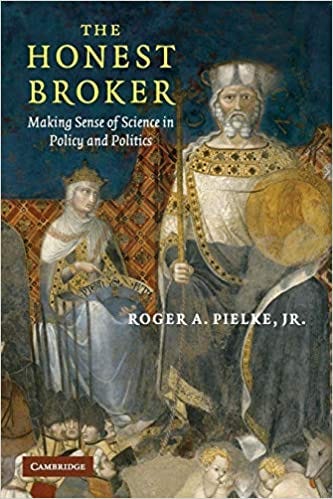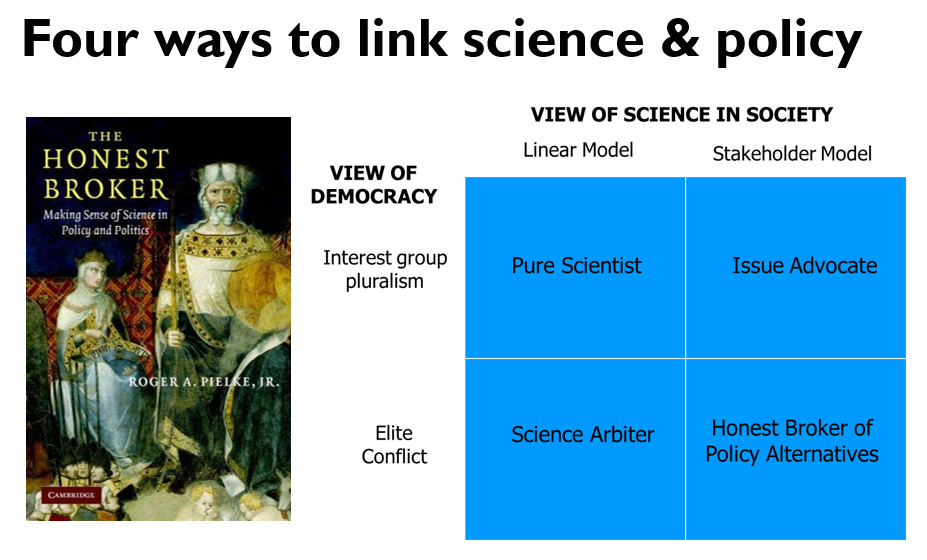SERIES: Making sense of science in policy and politics
Part 1: An introduction to The Honest Broker Framework
With today’s post I am starting up another series — this one is focused on the framework presented in my book, The Honest Broker.
There I describe four modes of engagement by scientists and other experts. These four modes are best thought of as ideal types to help us think through and discuss the different ways that experts can engage in policy and politics. The four modes are shown in the 2x2 matrix below.
The different modes are related to how we think about democracy and how we think about the different roles of science in society. The book goes into more detail on the theoretical background. Here I provide a high-level overview of the different roles to provide a more precise vocabulary for ongoing discussions of experts in policy and politics.
The Pure Scientist
This role might not really exist in the real world. Well, maybe it does for a brief moment when a beginning graduate student finds someone willing to pay them to do research that s/he is curious about. But in the real world, grant applications, research funding and scientific research in general comes with expectations of impact and relevance. In any case, if the pure scientist really did exist, the role is often defined by a desire not to engage – hence the claim to “purity.”
The Science Arbiter
This role supports a decision maker by providing answers to questions that can be addressed using the tools and methods of science. We are most familiar with science arbiters in the form of expert advisory committees, such as those of the national academies or governmental committees. Dan Sarewitz and I have outlined a formal methodology for thinking about and evaluating science arbitration (here in PDF). Science arbitration is common and there are many examples of it being done more or less well. On issues people care deeply about science arbitration is never far from politics.
The Issue Advocate
The defining characteristic of the issue advocate is a desire to reduce the scope of available choice, often to a single preferred outcome among many possible outcomes. Issue advocacy is fundamental to a healthy democracy. Advocacy among scientists is often viewed pejoratively, but I don't think it necessarily has to be – but it can be performed better or worse, and with positive and negative consequences. Advocating for candidates, policies or even directions of travel is worth doing, but at the same time, scientists should have a sense of consequences and responsibilities when they chose to become advocates. Advocacy is the most common role that each of us tend to play when seeking to connect our expertise with decision making.
The Honest Broker of Policy Alternatives
The defining characteristic of the honest broker is a desire to clarify, or sometimes to expand, the scope of options available for action. I often cite travel websites like Expedia as examples of honest brokers in action — they tell us what we could do, not what we should do. Sometimes people get caught up on the word "honest" here — what is important is the commitment to clarify the scope of possible action in order to empower decision makers. Sometimes honest brokers are unnecessary in a political setting, for instance, when advocacy groups collectively cover the scope of available choice. But other times policy making would benefit from greater clarity on available choice and consequences of alternative choices, including the invention of choices previously unseen. This is especially the case for issues that have landed in a political gridlock or require highly specialized expertise.
There is actually a fifth category in the framework, what I call the Stealth Issue Advocate. This role is characterized by the expert (or politician) who seeks to hide their advocacy behind a façade of science, either pure scientist or science arbiter. This role seeks to swim in a sea of politics without getting wet. It is the fastest route to pathologically politicizing science. It is also what gives scientists as advocates and politicians who seek to hide behind science a bad name.
A few notes on the framework:
In this framework, there are no hidden or alternative roles. This is it. Sometimes I hear a call for experts to be a "science communicator" —one who simply wants to elevate the quality of public debate. Communication is of course import in each of the roles. Calling oneself a “science communicator” without otherwise thinking through one’s role is a good recipe for stealth issue advocacy.
It is really difficult -- especially in highly political settings -- for any one individual to play the role of science arbiter or honest broker. This is due to the fact that there are often many views on what "the science" says (including uncertainties and areas of ignorance) or what the possible scope of action looks like. In addition, each of us has biases and idiosyncrasies which can make it difficult to see an issue from multiple perspectives. Even further, it is a rare policy issue where anyone knows everything of relevance.
Science arbitration and honest brokering of policy alternatives are best done by committee, ideally, by legitimate, authoritative bodies which are well-connected to policy makers.
It is a responsibility of the expert to be informed about engagement before engaging. It does no good to explain how you wish the world worked or how it should work a s an excuse for not understanding real-world political context. We often ask that policy makers learn more about science – that is appropriate. But we also should expect that experts in various areas of science learn more about politics well before actually engaging in politics.
A well-functioning system of decision making and expertise will find all four roles well populated. Context of course matters for what roles are more or less important. The proper role of an expert in the face of an approaching tornado will be very different than in the context of setting a national abortion policy – to take an example from the book.
Because advocacy is often a default role and it is so appealing, there is a need to support the institutionalization of mechanisms of science arbitration and honest brokering. In most highly political issues, there does not appear to be any shortage of advocates. In fact, at times our most authoritative science advisory bodies seem to be seduced into playing the role of issue advocate, leading to a potential loss of their legitimacy in public debates. This has been a big issue in responses to COVID and one I’ll return to in the future.
There are strong incentives for science to be politicized but also for politics to become scientized. Science has great standing among the public, which can work against thinking carefully about proper roles and responsibility, especially if we come to believe that science somehow sits above politics.
Ultimately, I tell my students that I really don't care what roles they decide to play (although I do recommend against stealth advocacy!) over their careers. What matters is having an open discussion about roles and responsibilities while developing a sophisticated understanding of the practice of politics.
Ultimately, scientific integrity matters because we need expertise in decision making. But maintaining scientific integrity requires careful attention to roles and responsibilities, and sometimes choosing a path that facilitates decision making rather than trying to determine it.
In future posts in this series I’ll draw upon the vocabulary of The Honest Broker to dive deeper into real-world examples of science in policy and politics.
Paying subscribers to The Honest Broker receive subscriber-only posts, regular pointers to recommended readings, occasional direct emails with PDFs of my books and paywalled writings and the opportunity to participate in conversations on the site. All paid subscribers get a free copy of my book, Disasters and Climate Change at this link. I am also looking for additional ways to add value to those who support my work.
There are three paid subscription models:
1. The annual subscription: $80 annually
2. The standard monthly subscription: $8 monthly - which gives you a bit more flexibility.
3. Founders club: $500 annually, or another amount at your discretion - for those who have the ability or interest to support my work at a higher level..






Thanks for Cliff, er Pielke, notes. After 23 years bouncing around inside the business, emission trading, and policy world nationally and internationally, I can attest to your outline, Roger.
P.S. In 1999, Microsoft didn't have a single lobbyist in Washington.
I will be interested in going thru this. I think the framework holds up well for explaining the roles that the expert/scientist may play, but I think it's incomplete if it doesn't take into consideration:
• the decision itself;
• the decision-maker - after all, experts advise, but leaders decide; and,
• the expert/scientist themselves.
The latter is particularly important. Are they a hedgehog or a fox, i.e., what are the limits of their expertise in terms of knowledge domains. Within their domain, have they had the same experience 30 times, or thirty different experiences.
Given limits on knowledge and experience, the Honest Broker has to be the preferred role for experts in assisting decision-makers, particularly those decisions that go beyond the science and involve human values. Senator Warnock has a very apt quote he attributes to his Dad: "Do the job you're hired to do." We elect or appoint leaders or managers to make decisions; they have experts to advise them.